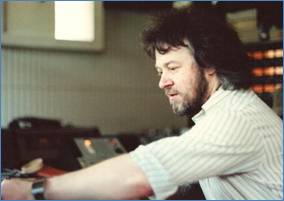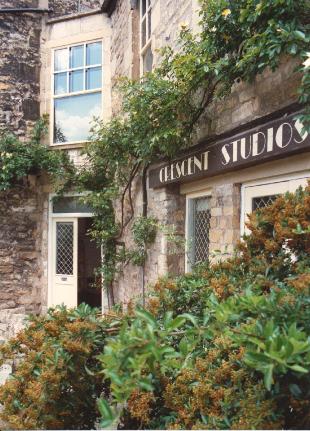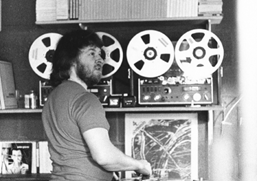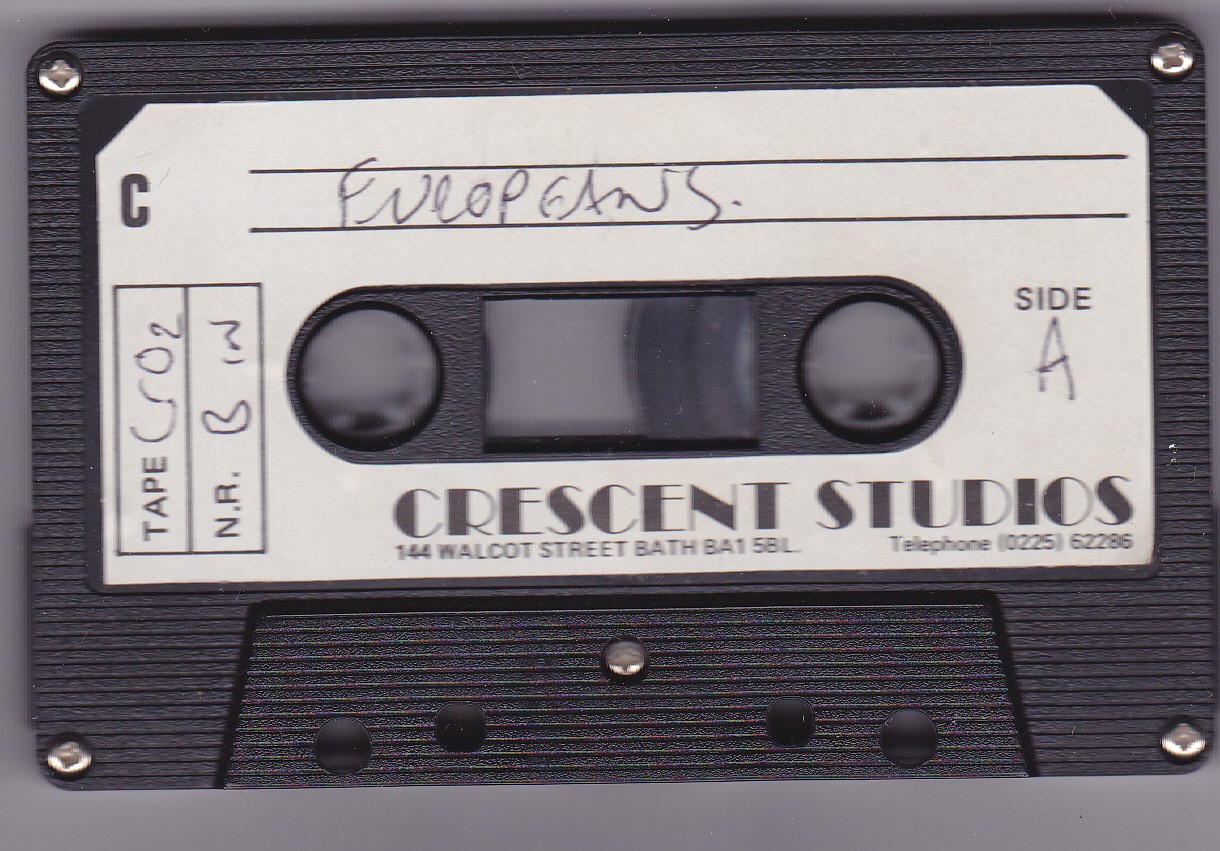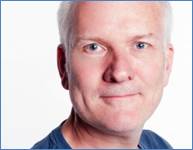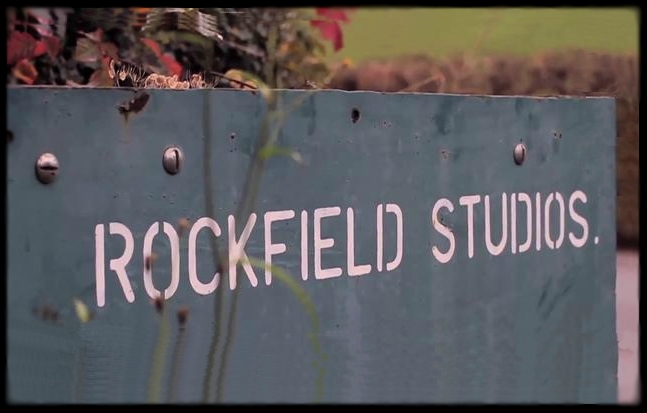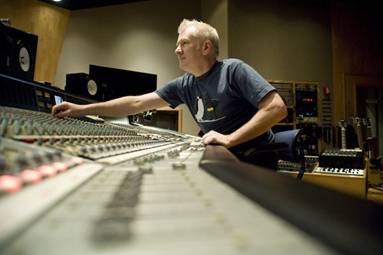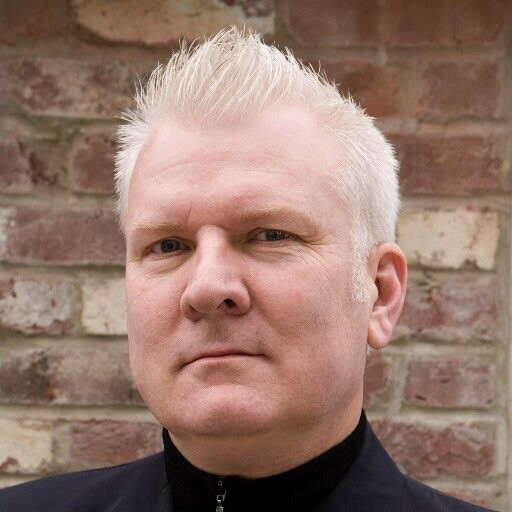The Production Team:
David Lord & Warne Livesey
|
As well as running this website, I’m a self confessed
recording studio geek! I have always
been fascinated with how records are made, and how the various sounds are
committed to tape. When I find the
time, you’ll catch me in front of a reel-to-reel tape machine and rack of
analogue equipment helping to create and capture all sorts of weird and wonderful
sounds. I have been chasing David and Warne for a number of years for their recollections of working
with Europeans
and How We Live,
and I’m pleased to present the results!
They are a great read, and I hope you enjoy them as much as I
did. Thanks to both for their time! |
|||
David Lord
|
|
After remixing (and remaking) a number of tracks for the Vocabulary album in 1983, David Lord went on to produce the Live and Recurring Dreams LPs for the Europeans, as well as the How We Live LP. Many of the songs were recorded and mixed
at David’s own Crescent Studios, in the beautiful Georgian city of Bath. A popular, and well renowned studio
throughout the 1980s, it played host to many other big acts of the era
including The Korgis, Tears For Fears, XTC, Echo and the Bunnymen and many
more. David’s work on Peter Gabriel’s
fourth LP (aka ‘Security’) was also groundbreaking, featuring some of the
first digital sampling technology.
Crescent has long since closed, but David still lives in the city, and
has a small studio at his home, with some of the original equipment. I caught up with him in late November 2014
for a reminisce about Crescent, and his work with the band. By his own admission, his memory is not
what it used to be, but it is all good stuff nonetheless! Thanks to David for his time, and use of
his photographs. Please have a look at David
Lord‘s own website at http://www.dlord.co.uk/
for more
information on his work. |
|
How did you end up working with
Europeans? It was
through Mark Thompson, who was managing me at the time. He was managing Roy Harper then too. Any recollections of the ‘Europeans -
Live album’ ? All I
remember is doing some live stuff with them in a club in North London
somewhere. I think I just went
along. There was a mobile truck there. Tell
us more about recording the Recurring Dreams album... We did
rhythm tracks up at Rockfield, and I suppose most of the overdubs at
Crescent. I remember at Rockfield, we
used an acoustic piano, (the same one featured on Queen’s Bohemian Rhapsody!)
but I seem to remember most of the piano was the Yamaha Electric Grand. Steve was having trouble with
headphones and we ended up with his piano in the Control Room at Crescent,
I’ve got a picture of it sloping up that way so he could stand between the
two speakers. He liked to play and
sing at the same time. We managed to
record some of the vocals that way, using a Shure SM57 microphone. We did a lot of that with Peter Gabriel
too, recording ‘live’ with a Shure in the control room rather than all the
pressures of being in front of a (big and expensive) U47 microphone! We were pretty intensive with
overdubbing. I have a feeling we
replaced the bass. Colin would have played his guitars
in the control room. I think he had a
radio transmitter to a stereo rig up in the studio. |
|
Can you sum up your role as a producer? I thought
they were great songs. I’ve always
loved those songs. It’s awful that I can’t remember such things when you’ve
worked so intensely on a lot of stuff.
Sometimes when I listen back to things I have no recollections that it
was even me who recorded or produced it!
Some bands you feel you could contribute a lot to. But a band like Europeans, I’m not sure they really
needed a lot of my ideas. They were
pretty fully formed. Warne probably contributed a lot
too. He’d worked with them before I
knew them. I enjoyed working with
them. I was surprised when they fell
out. Do you have any particular
recollections of making the How We Live album? A friend of
mine’s husband, Bruno Schrecker
was a famous cellist in the Allegri String Quartet. I thought of having a real quartet (for the
title track ‘Dry Land’). They came and
played in the foyer at Crescent, as it was more ‘live’. I don’t think they had done any overdubbing
before, so wearing headphones was a bit odd for them. It just about worked out alright. There’s a
little chapel near here that was used for art exhibitions. It was a graveyard behind the studio, and
when they redeveloped the area they dug up all the graves and the chapel was
left there. For the acoustics, we put
an amp in the chapel and ran a guitar lead down there. Bands used to rehearse in there! We once recorded the Burundi Drummers in
the field behind the studio. I quickly
set up some microphones around them and we tried to spread the word round
Bath to get an audience down! 8. |
|
|
|
|
|
Manny Elias, drummer for Tears for
Fears appears on the album. Was that
your connection too? Manny was
our local drummer. I only ever did one
track with Tears for Fears called
‘Suffer the Children’. Although we did
all their stuff up ‘til then as they were an acoustic duo managed by a local
hairdresser who discovered them. We
did lots of demos in my flat down the road.
Glenn Tommey (my assistant) turned them into a ska band called ‘Graduate.’ They did a lot of gigging and touring
before they became Tears for Fears. When they released their first album, they
re-recorded ‘Suffer the Children’ but my version was used as the b-side of
the ‘Mad World’ single. Are you still producing? What have you been up to recently? Anything
that I find interesting and suits my set up.
It’s a small recording space.
The occasional singer or instrumentalist. I’ve done a lot of new age stuff. Until a year ago or so I did some TV and
film stuff, such as Cracker, Ruth Rendell Mysteries & Rebus. I’m still working with some guys from the Korgis and Stackridge. I’m doing a
lot of archiving and ‘rescuing’ for people.
I’m currently transferring some 78s and some BBC test pressings of the
‘Westminster Cathedral Choir’ from the 1940s and 50s. I find that, and sound restoring really
interesting. I still do some mixing
too, although it tends to be folk-y stuff, not heavy rock. I’ve written some music for a couple of
radio plays. There’s a singer called Chloe Goodchild, and also a girl
called Stevie Nicole Brown that we
found busking in Bath. She’s just
started to write her own songs which are quite promising. (Visit her site at www.stevienicolebrown.com
) If someone
comes along like that that I think is worth helping, I will, otherwise I
consider myself semi retired. I’ve got
my pension now! |
Here are a handful of great Europeans
photographs taken by David Lord
during the ‘Recurring Dreams’ overdub sessions at Crescent Studios, Bath in the
summer of 1984:
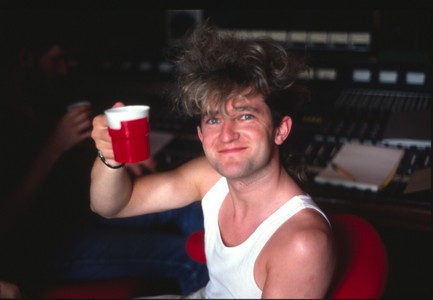
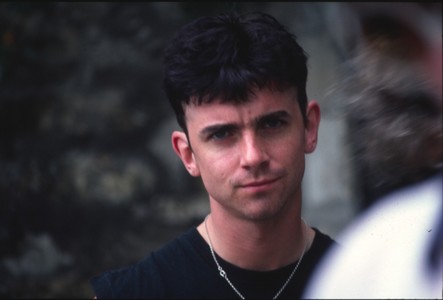
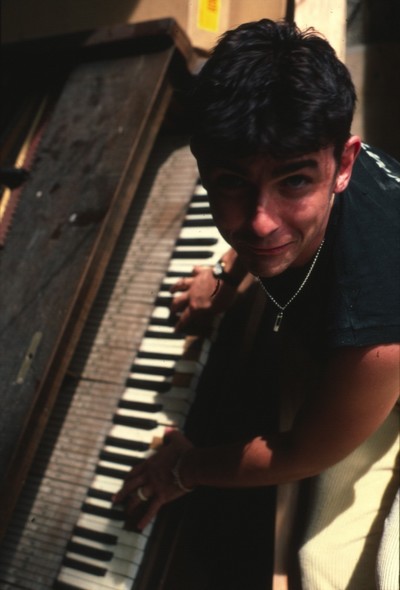
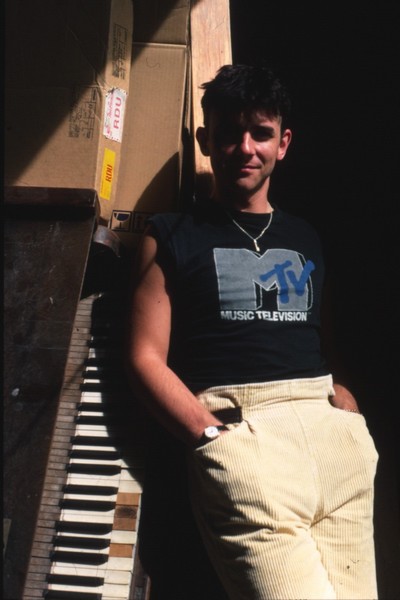
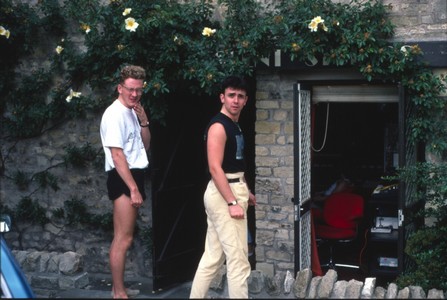
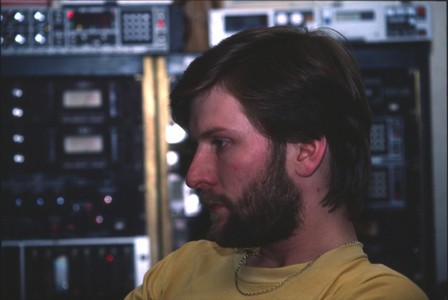
Warne Livesey
|
|
Starting as a demo engineer for Europeans, Warne progressed to engineer for Recurring Dreams and then the How We Live
album. Working closely alongside David
Lord, they helped capture the sound of a band at their peak. After working with Euros and HWL, Warne worked with Matt Johnson on two The The albums, followed by increasingly high profile producer
roles with Midnight Oil (Diesel
and Dust), Julian Cope and Deacon Blue. He currently lives and works in Toronto, Canada, at his
own studio ‘The Command Centre’. I
interviewed Warne by Email in June
2015. Visit Warne’s website at www.warnelivesey.com
|
|
How
did you come to work with ‘Europeans’ ? I had been doing a fair bit of work at a Wave Studios (my
own projects and productions etc) and Europeans booked in to do demos. They needed an
engineer and the studio owner asked me to do the session as I freelanced for
him a fair bit. I remember they brought in a lot of gear to the session. More than would be typical at that studio,
as it was more of a low budget studio and they were a band with a major label
deal. I specifically remember Steve
having a lot of keyboards and racks. Whilst I was setting up microphones they
had a piano tuner work on his Yamaha CP70. After an hour the band arrived and
Steve went over and switched on
all the racks and started playing the CP70 with a load of chorus, delay and
reverb on it. It was the 80s after all! After a few minutes he looked at the
piano tuner and said, “sounds great, thanks”. The piano tuner looked
confused. That was the first time I met them all. We had pretty guerrilla sessions. They had some great
songs and we got on really well. The band were very pro and had their shit
together. They were all strong players. So we basically blasted through bed
tracks and did overdubbed vocals and a few extra bits. I got sounds pretty
quickly and it all sounded pretty good for demos. You
worked alongside David Lord in the mid 80s.
How did the engineer / producer relationship work in the studio? After the experience working with them on those demos I
guess they liked what I did as they suggested to David Lord (who they had decided would produce the record) if he
would be OK with me engineering. David
was open to the idea and asked to meet me, which we did and got on well. I
was really excited to work with him. I loved his work, particularly the 4th Peter Gabriel record. After we worked
on the Europeans
he asked me to engineer for him on a bunch of other records. I learned a lot
from him. He is a seminal producer to me. He is a great musician. And also
understands sounds and is a great engineer. He is an audiophile, but his
desire to create new sounds would lead him to treat all the rules with a
healthy amount of contempt. And I guess we were on the same page in
that regard. Up until that point, I had had an atypical journey in
recording. I started as a musician. I never worked in a studio as a staffer,
so I didn’t come up through the ranks of assistant etc. In fact I produced a
record before I learned how to engineer. But I was hungry for all knowledge
about recording. So I looked for every opportunity to make records with
people, in any capacity. David
understood how music and sounds related. He was an expert at crafting all
elements of music so they blended and enhanced the whole. He was creative
himself, with lots of ideas. But also encouraged everyone else to be
enthusiastic about contributing. He was how I imagine George Martin would be, and how I aspire to be: inspiring the
artiste to be the best version of themselves whilst also contributing your
own creativity. Although I had produced, engineered, written and played on
recordings before then, working on "Recurring Dreams" was a very
important record in my career. Everything I had done to that point was low
budget and Indie. People would come to me with maybe £10k and say, can we
make an album? And you would make it work. But working with the Europeans was my
first experience of a major label budget. I don’t know what that record cost.
But I would guess 10 times what I was used to. So, even though I had worked
with many talented and accomplished people to that point, this was the first
time I experienced really doing a fully pro record. And David Lord being at the helm with all his experience showed me
how it was done… and that knowledge would become invaluable in the near
future. |
|
Can
you remember any unique recording techniques or set-ups that the band used? Yes. So, with all the pieces in place, off we all went to
the legendary Rockfield Studios in South Wales, to make the record for real.
We set the drums up in a different room to the rest of the band. It was
acoustically great, but a bit weird for communication. We tracked beds with
everyone playing, but were really only focused on drums and bass, which we
printed to a 16 track 2” Studer tape machine. This was David’s call upon
learning the studio had a 16 track head block. And it was solid gold ladies
and gents and all those interested in recording things, because this is about
as good as it gets. Even to this day you will not hear better sounds than
those recorded on a 16 track 2” Studer. You had to have SMPTE time code on
one track then we filled the remaining 15 tracks with drum and bass madness.
What’s more, after we had completed all the rhythm track recordings, we
bounced them to a 24 track slave (reducing the 15 tracks to 5) so we had 18
tracks to record overdubs to. They had
a Trident console there at the time, which sounded great. And we used a lot
of chorus and delays and synths and shit. It was the 80’s after all. And we
got good a Space Invaders. |
|
|
|
|
After we finished recording, the band asked me where I
would like to mix. To be honest, the concept of mixing in a different studio
was alien to me at the time. But I had read "Sound On Sound”, and I knew
people, and it was the early 80’s, and everyone was a buzz with SSL, and I loved
Trevor Horn, and I knew he and Julian Mendelson and Gary Langan worked at
Sarm Studios, so I said Sarm. And they said “OK”. Then I privately freaked
out. I had no idea how an SSL worked. Never seen one. I just thought it would
be awesome. I had a few weeks to prep, so I called SSL and said, “look, I’ve
got myself into a bit of a pickle. I’m an engineer and I’ve never
worked on one of your consoles, but I’m booked into Sarm to mix a record in a
few weeks and… help!”. They said, “No problem. come to Oxford and we’ll give
you a manual and let you play in our studio for a day and it will all be
good”. So that’s what I did. I got the train there one day and they gave me a
bit of instruction and a manual, and then they left me in their studio and
said, “pick a multitrack and have fun”. I went through the box and found a
copy of “Making Plans For Nigel”, by XTC,
and produced by the incredible Steve Lillywhite, and thought “Yer, baby!”.
And I sat there for a day, doing my own mix of “Making Plans For Nigel” and learning
how to use an SSL. After
Europeans split, you worked with Steve and Colin on the ‘How We Live’
album. How was this different from working with the Euros? Yep. Well, it was different, and the same. The music was
mellower and I produced some of the latter. |
|
Did
you enjoy working at Crescent Studios in Bath, and do you have any particular
memories of your time there? Yes, I loved working there. I did a lot of work there with
David and also took my own
projects there sometimes. Bath is a great city and a cool place to spend time
in. I remember there was a quirky B&B I stayed in there. The couple that
ran it were kind of nutty and charming. The woman used to wake us up for
breakfast by singing opera down a cheap intercom. It was kind of a ‘Fawlty’
Towers experience! Are
there any standout songs that
you remember working on? Well, ‘You Don’t Want Me In Your Life’ and ‘Acid Rain’
were cool.
Well, by coincidence, Geoff
married my manager and I used Geoff
on a few sessions with other artists, so I did see him a fair bit. Also, I
got Steve to play a piano solo on
a The The record, but that was
technically still the 80’s. Colin
and I remained friends and saw each other from time to time. But I guess I
haven’t seen any of them in 20 years or so, which makes me sad. Still, I
haven’t seen bits of myself in that long, so there you go. What I do know is,
if I did see them I would give them a big hug and it would be like it was
yesterday when we were all young whipper-snappers. |
|
Your
post-Euros cv is filled with many amazing credits. Which other bands or
artists have you particularly enjoyed working with? Thanks. As I said earlier, that experience would prove
invaluable when I started to get bigger production gigs myself. The The was the first big production
gig for me. And is still one of my favourite projects. I did 2 records with
Matt. They were very exacting recordings, taking a year each. Matt Johnson is an incredible talent
and we really pushed ourselves on those records to make something unique. We
also had pretty limitless resources and got to work with great players,
orchestra, horns and even a male voice choir. It was good times. Then I’ve
done 4 albums with the Australian band Midnight
Oil that were great fun too. I love Australia, and the band were killer.
I also work a lot with a Canadian artist called Matthew Good. We are actually just finishing up our 7th album
together. But to be honest, I pretty much enjoy every record I work on. I
love recording and music people. And I only take work I’m really into. So
it’s always fun and challenging in a good way. |
|
|
December 2015
Back to Articles
